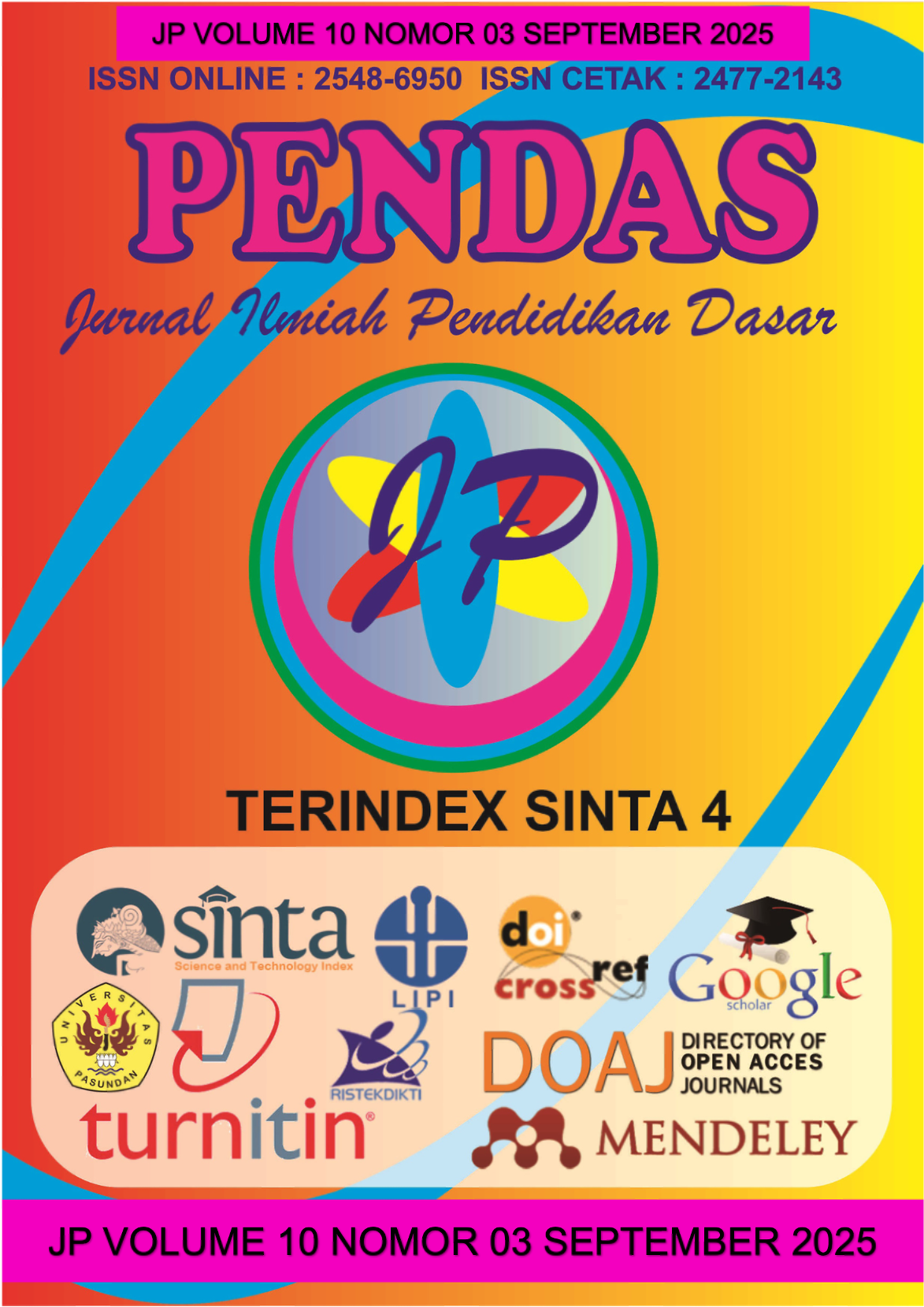VALIDITAS E-CARD EDUDAYA: MEDIA PEMBELAJARAN BERBASIS ETNOMATEMATIKA DAN TEKNOLOGI DIGITAL UNTUK SISWA SD
DOI:
https://doi.org/10.23969/jp.v10i03.33696Keywords:
learning media, ethnomathematics, elementary schoolAbstract
This study aims to develop the e-Card Edudaya learning media based on the culture of South Kalimantan to improve numeracy literacy in elementary school students, particularly in the topic of flat shapes. Identified issues at Pelambuan 2 State Elementary School, Banjarmasin, include low student performance in understanding basic mathematical concepts and the lack of interactive learning media relevant to students' everyday lives. This research uses the Research and Development approach with the ADDIE (Analysis, Design, Development, Implementation, Evaluation) model. During the Analysis phase, the problems in the school were identified, along with a needs assessment for students. The Design phase focused on creating an application that integrates interactive technology with local culture, while the Development phase resulted in the creation of learning content using video, images, and text, incorporating elements of South Kalimantan culture. Validation results from media experts, elementary education experts, and mathematics experts showed average scores of 90%, 89%, and 90%, respectively, indicating the application’s effectiveness in enhancing students' understanding of mathematics and numeracy
Downloads
References
Anwar, S., & Umami, M. R. (2025). Developing an Ethnomathematics–Collaborative Augmented Reality (ME-CAR) Module to Optimize Numeracy Skills and Self-Efficacy. Journal of Mathematics Education and Learning, 15(2), 112–129.
Balalle, J. (2024). Gamification-based digital learning platforms for enhancing numeracy in primary education: Evidence from Southeast Asia. Education and Information Technologies, 29(5), 7713–7735. https://doi.org/10.1007/s10639-024-11912-3
Dewi, S. V., Saputra, H., & Happy, N. (2025). Ethnomathematical practices and their influence on elementary learners’ numerical literacy: A quasi-experimental study. International Journal of Teaching and Learning, 8(1), 55–70. https://injoqast.net/index.php/INJOTEL/article/download/382/354
Dhema, M., Cholily, Y. M., et al. (2025). Tracing local wisdom in the integration of ethnomathematics in vocational high school mathematics education: A Scopus systematic review. International Journal on Science and Mathematics Education, 13(2), 187–205. https://ejournal.radenintan.ac.id/index.php/IJSME/article/download/28208/9732
Djam’an, N. (2023). Asian research in mathematics education: Mapping the field. In Mathematics Education Research in Asia (pp. 145–165). Springer.
Djam’an, N., Mariana, N., & Simanjorang, M. M. (2023). Trends in mathematics education research in Indonesia. In Mathematics Education Trends in Asia (pp. 183–199). Springer.
Hermanto, B., & Retnowati, E. (2022). Technology-enhanced mathematics learning to improve elementary students’ numeracy skills in Indonesia. Heliyon, 8(12), e12045. https://doi.org/10.1016/j.heliyon.2022.e12045
Iswara, H. S., Ahmadi, F., & Ary, D. D. (2022). Numeracy literacy skills of elementary school students through ethnomathematics-based problem solving. Indonesian Science Education Journal, 11(2), 155–165. https://iss.internationaljournallabs.com/index.php/iss/article/download/316/320
Kamid, K., & Septiani, A. (2023). Blended learning model in mathematics education: Enhancing students’ numeracy in rural Indonesia. Cogent Education, 10(1), 2184562. https://doi.org/10.1080/2331186X.2023.2184562
Lindang, M., Rahman, A., & Yusuf, M. (2024). Embedding local cultural practices into mathematics teaching: Strengthening numeracy through ethnomathematics. Journal on Mathematics Education, 15(1), 33–50. https://doi.org/10.22342/jme.15.1.24246
Masruroh, M., & Amir, M. F. (2024). Innovative learning media: Ethnomathematics-based modules for elementary school students. Journal of Language, Literature, and Society, 12(1), 233–247. https://ejournal.undiksha.ac.id/index.php/JLLS/article/download/68306/29545
Muhammad, R. R. (2023). A framework for active learning in secondary mathematics in Indonesia: A case study using ethnomathematics approach [Doctoral dissertation, Coventry University]. Coventry University Repository.
Munthahana, J., & Budiarto, M. T. (2023). The application of ethnomathematics in numeracy literacy perspective: A literature review. International Journal on Science and Mathematics Education, 11(3), 211–224. https://ejournal.radenintan.ac.id/index.php/IJSME/article/download/17546/6440
Nguyen, L. T., & Pham, T. N. (2022). Primary students’ mathematical literacy in Vietnam: Lessons for Southeast Asia from PISA. International Journal of Educational Development, 93, 102653. https://doi.org/10.1016/j.ijedudev.2022.102653
Nguyen, L. T., & Pham, T. N. (2023). Numeracy and literacy education in Southeast Asia: Comparative perspectives. Asia Pacific Education Review, 24(2), 295–310. https://doi.org/10.1007/s12564-023-09854-2
OECD. (2023). PISA 2022 results: Learning mathematics in a digital world (Volume I). OECD Publishing. https://doi.org/10.1787/7f6c92a9-en
Rahman, H., & Widodo, S. (2023). Integrating local wisdom in mathematics education: The case of batik geometry in Indonesia. Journal of Ethnomathematics Research, 5(1), 1–15.
Sakerani, L., Nasution, H., & Pratiwi, N. (2023). Elementary students’ difficulties in understanding plane figures: An Indonesian case study. European Journal of Educational Research, 12(4), 1823–1835. https://doi.org/10.12973/eu-jer.12.4.1823
Suherman, S. (2025). Mathematical creative thinking: An ethnomathematics-based test and factors influencing the achievement of secondary school students in Indonesia [Doctoral dissertation, University of Szeged]. Szeged Repository.
Sunzuma, G., & Umbara, U. (2025). Ethnomathematics-based technology in Indonesia: A systematic review. Journal of Mathematics and Culture, 19(1), 45–63. https://doi.org/10.1177/27527263241305812
Tan, C., & Lim, S. (2024). Technology-supported mathematics education in Singapore: Lessons for ASEAN. Asia Pacific Journal of Education, 44(1), 65–80. https://doi.org/10.1080/02188791.2024.1882375
Tanujaya, B., & Prahmana, R. C. I. (2022). Using ethnomathematics to foster critical thinking in elementary school students: A focus on geometric concepts. International Electronic Journal of Mathematics Education, 17(3), em0689. https://doi.org/10.29333/iejme/12157
Yuliana, Y., Usodo, B., & Riyadi, R. (2023). The new way to improve mathematical literacy in elementary school: Ethnomathematics module with realistic mathematics education. Al-Ishlah: Jurnal Pendidikan, 15(3), 2541–2555. https://journal.staihubbulwathan.id/index.php/alishlah/article/download/2591/1312
Downloads
Published
Issue
Section
License
Copyright (c) 2025 Pendas : Jurnal Ilmiah Pendidikan Dasar

This work is licensed under a Creative Commons Attribution 4.0 International License.



















